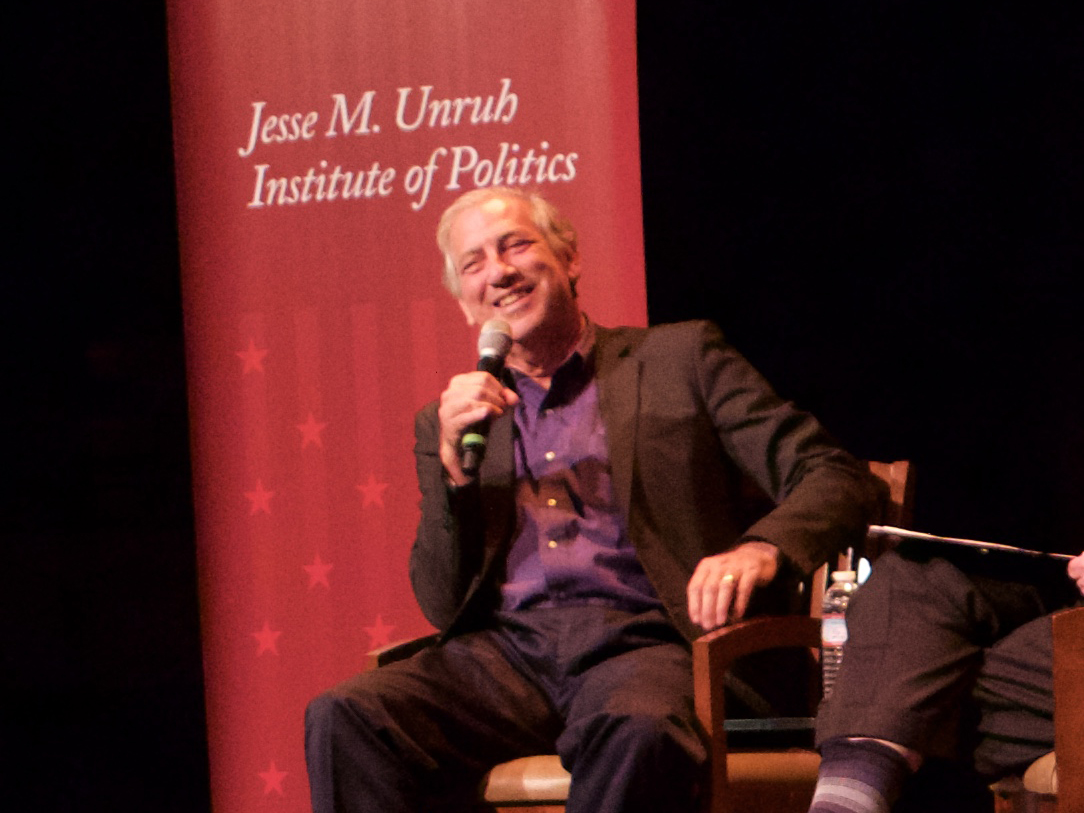Joe Trippi shares insight on Alabama special election
Democratic strategist and esteemed campaign manager Joe Trippi discussed his insider perspective on Alabama Senator Doug Jones’s campaign, the internet’s role in politics, and the future political scene with USC’s Director of the Jesse M. Unruh Institute of Politics Bob Shrum. The conversation, one of several in the Institute’s semester-long speaker series, was held at Tommy’s Place.
The discussion began with insights into the Doug Jones campaign, where Trippi served as media strategist and senior advisor. When asked how Jones, a Democratic running in a deeply Republican state, managed to pull off an upset victory, Trippi responded that it was Jones’s message, not data analytics or allegations against his opponent, that won him the race.
“He hit a chord with republican women, with college educated republicans, younger republicans, who were getting tired of the chaos and the division and the hostility, and were willing to vote for a democrat for the first time in their lives because he so exuded that urge to work across party lines and find common ground,” Trippi said.
Trippi also dismissed the notion that the sexual misconduct allegations against Jones’s opposition played a significant role in the race. If anything, he noted, they made the race more partisan, something the campaign was trying to avoid. Their goal was to tap into the bipartisan hunger to come together as a country in the face of the hostility, not demonize one side.
After discussing the Jones campaign, Shrum shifted the conversation to the internet’s role in politics. Trippi, who essentially pioneered the internet campaign with his work on Howard Dean’s 2004 presidential run, expressed the internet’s great potential, while maintaining its harmful ability to isolate and the ease with which it can manipulate people. He used the Jones campaign to illustrate this last point.
“If you look at the hacking and the bots, I mean in the Jones campaign, we were tracking 10,000 bots that were posting 65,000 posts per hour, all doing fake yearbook, and things like that,” Trippi said. The ramifications, though not quantifiable, could in theory swing an election.
Despite this danger, Trippi praised the internet for being an immensely efficient low-dollar fundraising mechanism and for engaging more people in the democratic process.
According to Trippi, the internet, and more specifically social media, gave President Trump’s campaign its edge.
“Trump understood how much power social media can have to engage people who don’t normally participate in the process,” Trippi said, “using social media to directly communicate to 17 to 18 million people…in a process where only 25-30 million total were going to participate in the Republican primary,” let him reach out to voters directly, significantly boosting his campaign’s success.
On a broader note, Trippi gave his input on the current state of politics and his predictions for the future.
“The energy right now, Donald Trump is fueling two things: massive energy with democrats…and a growing unease with a significant enough segment of the Republican party and Independents,” Trippi said
From Trippi’s perspective, Trump has created anger in the Democratic base and exhaustion in his own party. This lead Trippi to predict Democrats not only winning the House of Representatives in the 2018 election, but taking the Senate too.
As the conversation came to a close, Trippi revealed his immense hope in the youngest generation.
“My optimism comes from your generation [addressing the audience, mainly students].” He pointed out that Millennials are now the largest generation, so their electoral power will soon pass other generations, and that young people have the capacity to pressure today’s leaders, as seen in Florida in the wake up the Parkland school shooting.
Max Ellis, a freshman majoring in political science, said Trippi’s hope in his generation had the biggest impact on him.
“I’ve always looked at it personally as who’s going to be the next big face, who’s going to be the next big figure or leader for our country…but him saying that it could be a whole generation was pretty informing,” Ellis said.

